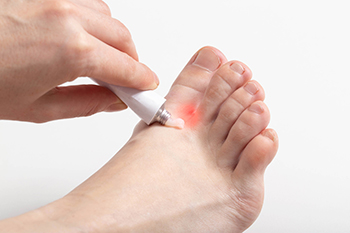 Athlete’s foot is a very contagious fungal infection that often thrives in warm moist environments such as showers, locker rooms, and swimming pools, and it can spread from things such as towels, floors, and clothing. Unless the feet have been washed and dried thoroughly, fungal spores can penetrate any fissures or sores and begin to spread. The infection may also spread by hand to other parts of the body when it is scratched or touched. Because of how easily it spreads, good foot hygiene is one of the most important factors to prevent Athlete’s foot. As a result of Athlete’s foot, the feet can become dry and flaky, and they will get itchy and scaly. Patients who have Athlete’s foot should visit a podiatrist to properly treat the infection.
Athlete’s foot is a very contagious fungal infection that often thrives in warm moist environments such as showers, locker rooms, and swimming pools, and it can spread from things such as towels, floors, and clothing. Unless the feet have been washed and dried thoroughly, fungal spores can penetrate any fissures or sores and begin to spread. The infection may also spread by hand to other parts of the body when it is scratched or touched. Because of how easily it spreads, good foot hygiene is one of the most important factors to prevent Athlete’s foot. As a result of Athlete’s foot, the feet can become dry and flaky, and they will get itchy and scaly. Patients who have Athlete’s foot should visit a podiatrist to properly treat the infection.
Athlete’s Foot
Athlete’s foot is often an uncomfortable condition to experience. Thankfully, podiatrists specialize in treating athlete’s foot and offer the best treatment options. If you have any questions about athlete’s foot, consult with one of our podiatrists from Garnet & Carbonell, DPM, LLC. Our doctors will assess your condition and provide you with quality treatment.
What Is Athlete’s Foot?
Tinea pedis, more commonly known as athlete’s foot, is a non-serious and common fungal infection of the foot. Athlete’s foot is contagious and can be contracted by touching someone who has it or infected surfaces. The most common places contaminated by it are public showers, locker rooms, and swimming pools. Once contracted, it grows on feet that are left inside moist, dark, and warm shoes and socks.
Prevention
The most effective ways to prevent athlete’s foot include:
- Thoroughly washing and drying feet
- Avoid going barefoot in locker rooms and public showers
- Using shower shoes in public showers
- Wearing socks that allow the feet to breathe
- Changing socks and shoes frequently if you sweat a lot
Symptoms
Athlete’s foot initially occurs as a rash between the toes. However, if left undiagnosed, it can spread to the sides and bottom of the feet, toenails, and if touched by hand, the hands themselves. Symptoms include:
- Redness
- Burning
- Itching
- Scaly and peeling skin
Diagnosis and Treatment
Diagnosis is quick and easy. Skin samples will be taken and either viewed under a microscope or sent to a lab for testing. Sometimes, a podiatrist can diagnose it based on simply looking at it. Once confirmed, treatment options include oral and topical antifungal medications.
If you have any questions, please feel free to contact our offices located in Palmetto Bay, South Miami, and Homestead, FL . We offer the newest diagnostic and treatment technologies for all your foot care needs.
